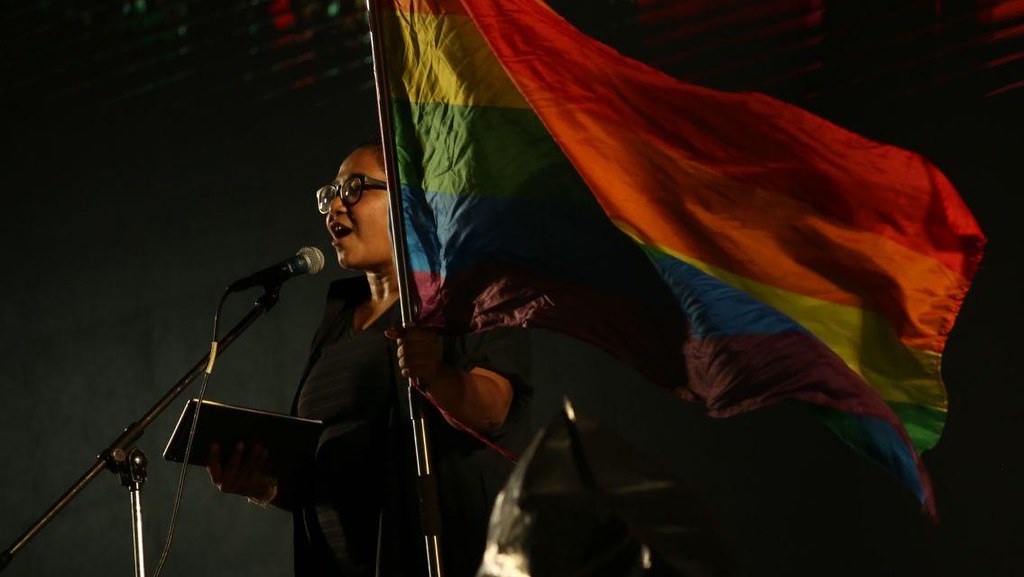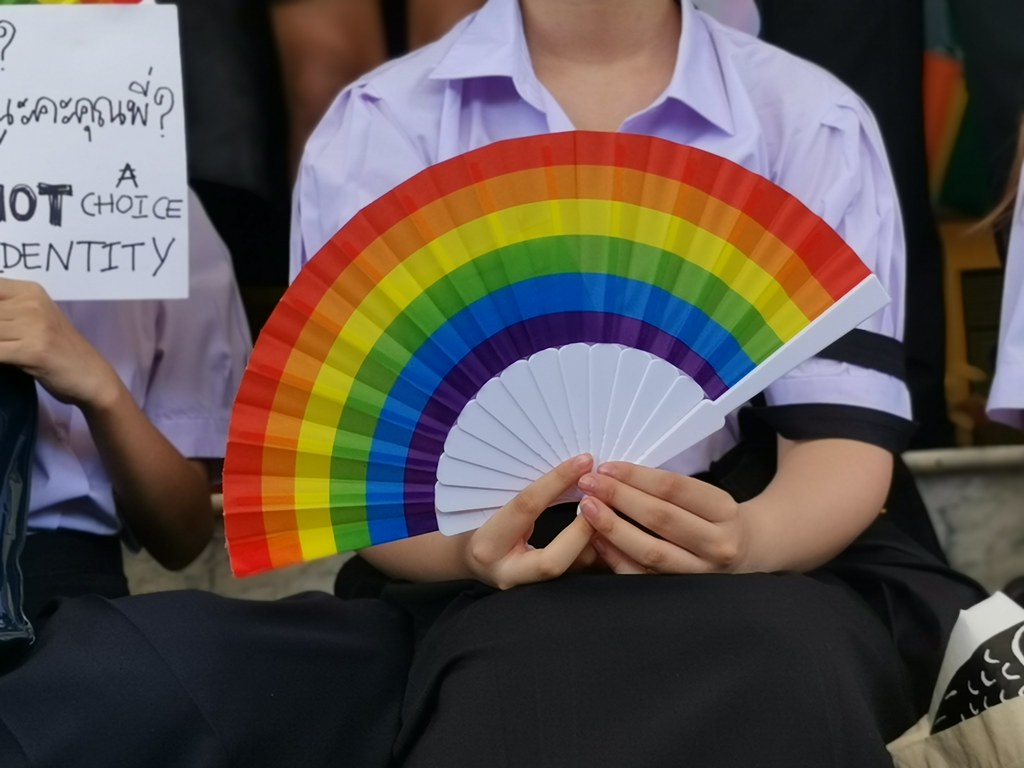Women and LGBTQ activists who participated in the 2020 pro-democracy movement are facing gendered harassment and discrimination even from within their own movement, says a new report by the Observatory for the Protection of Human Rights Defenders.

Participants at a students rights rally in September 2020, most of whom were high school girls
The report, titled “Standing tall – Women human rights defenders at the forefront of Thailand’s pro-democracy protests,” is based on interviews with 22 women and LGBTQ activists who participated in the pro-democracy movement and was published on Wednesday (3 February) by the Observatory, which is a partnership programme between the International Federation for Human Rights (FIDH) and the World Organisation Against Torture (OMCT).
The report notes that women and LGBTQ people have been at the forefront of the 2020 pro-democracy protests. Not only did young women make up a significant part of participants, they also played a key role and organizing and leading the protests. High school girls also played a significant role in the pro-democracy movement, and appeared to make up the majority of participants in protests organised by student rights groups against the outdated education system and abuses and mistreatment by teachers.
The report also notes that “an unprecedented movement for gender equality” emerged during the 2020 pro-democracy protests, and women and LGBTQ people became increasingly outspoken about gender issues, taking to protest stages to speak out against gender stereotypes, gender-based discrimination, sexual harassment, and rape culture. They also called for better representation of women and LGBTQ people on protest stages, marriage equality, decriminalization of sex work, the gender pay gap, and a democratic system that respects and promotes gender equality.

Protesters performing a Thai version of the Chilean feminist anthem "A Rapist in Your Path" during the Feminist's Liberation Front Thailand's activity at the Mob Fest rally on 14 November 2020.
Various women’s and LGBTQ rights groups were also formed, such as the Feminist’s Liberation Front Thailand, formerly the Women for Freedom and Democracy Group, which “ignited a national discussion” about women’s bodily autonomy and sexual and reproductive rights. The group also provides support for those who faced gender-based discrimination and harassment as a result of their activism.
Despite these developments, women and LGBTQ activists have been targeted by both state and non-state actors for their activism. In addition to the human rights violations they face for exercising their freedom of expression and peaceful assembly as activists, including criminal charges and arbitrary arrests, they have also been subjected to additional attacks from both state and non-state actors that are often gender-based or inflicted in gender-specific ways, including sexual assault and harassment.
Many activists interviewed for the report said that they face discrimination and sexual harassment while interacting with police officers. Chonnikarn Wangmee, a student activist from Songkhla, told the Observatory that she received messages such as “I miss you” and “I’m single” from police officers, while Lanlana Suriyo, a student activist from Thammasat University, said that police officers often act in a patronizing or threatening way towards her, shaming her for her activism, and making comments about her body.
Activist Chonticha Jangrew also reported that she experienced inappropriate behaviour from police officers, who inappropriately touched her or made sexual comments about her appearance, such as saying her breasts look big or that she looked sexy in a short skirt. They also teased her during negotiations, which she said “showed a lack of understanding about gender sensitivity and is just unprofessional.”
Meanwhile, student activist and protest leader Panusaya Sithijirawattanakul told the Observatory she experienced sexual harassment while she was taken into custody following the crackdown on the protest at the Government House on 15 October. She said that a male officer at Thanyaburi Prison, where she was initially detained, made unwelcome remarks towards her, telling her “you’re very pretty” and “I could not sleep after seeing your pictures,” and although she felt uncomfortable, Panusaya said she couldn’t complain out of fear of how she would be treated in prison.

Panusaya Sithijirawattanakul
Many women activists also reported verbal abuse and harassment from non-state actors aimed at them because of their gender and gender expression, which ultimately aim to question and delegitimize their work. All of the activists interviewed by the Observatory said they were frequently subjected to some form of online attack, intimidation, harassment, and defamation, including misogynistic and derogatory comments, threats of sexual violence, sexual harassment, public shaming, doctored photographs, sometimes with sexual elements. Gender stereotypes and the idea of “appropriate” behaviour, such as the notion that women should not be protesting on the streets or speak about controversial issues, have also been used to justify these abuses.
Lanlana said that she was attacked online after some protesters tore apart pictures of the King and Queen during a protest on 17 October at Thammasat University, for which she was one of the organizers, and a news agency reported the incident using her picture and a headline that included hate speech. She said that she received threats of physical and sexual assault from social media users, as well as hateful and sexist comments, causing her to be afraid for her personal safety. Meanwhile, Panusaya said she was attacked on social media for using offensive words to criticize a male politician – a stark contrast to the responses when male activists express their opinions in similar ways.
Women activists’ physical appearance and attire have also been used to target them. Student activist Sirin Mungcharoen said she was attacked for how she dressed, and that she received comments shaming her. She and Nantacha said that they experienced such hostility from all sides, including from people within the pro-democracy movement.
The report notes that such attacks intensify when women and LGBTQ activists challenge unequal power relations and tradition norms of gender, sexuality, and identities, and those who defend sexual and reproductive rights or fight for gender equality and LGBTQ rights are often considered “controversial”. Activists who discuss issues like abortion rights and sex workers rights are more vulnerable to misogynistic attacks aimed at “preserving good societal and cultural values.”

Sirisak Chaited
LGBTQ and gender-nonconforming activists also face additional attacks because their sexual orientation, gender identity or expression, as well as for defending rights related to gender and sexuality. LGBTQ rights and sex worker rights advocate Sirisak Chaited said that they face regular derogatory comments aimed at both their work and their gender identity and appearance. Activist Chitsanupong Nithiwana also reported transphobic comments from social media users.
Often, the activists are unable to defend themselves, and feel threatened, exploited, humiliated, sexualized, or discriminated against. When a picture of student activist Supitcha Chailom giving a speech at a demonstration in Chiang Mai was flooded with sexual comments and attacks against her appearance, she publicly condemned the comments as sexual harassment and was further attacked for being a “radical feminist” or a “man hater.”
These attacks against women and LGBTQ activists are “reinforced by an entrenched culture of impunity for abuses in Thailand,” says the report. With the exception of labour law provisions on sexual harassment in the workplace, Thailand does not have a law that recognizes other offenses of sexual harassment against women, and women activists who face such abuses are not able to access justice.
The activists interviewed by the Observatory also said that, since they did not believe in filing criminal defamation complaints, they could only resort to civil defamation lawsuits or pressing charges under the Computer Crimes Act, which does not cover verbal sexual abuses or online bullying, and since victims often bear the burden of proof in these cases, they lack resources to actually take legal action.
Within the movement itself, women and LGBTQ people often find that their views and contributions are ignored or excluded. Despite the prominence of women and LGBTQ people in the protests, many of the interviewees told the Observatory that they have faced exclusionary treatment from within their own movements, and feel that women are still not equally represented in leadership position.

Chumaporn Taengkliang, carrying a Pride flag, spoke on the main stage of the 19 September 2020 protest
Women and LGBTQ activists who work on gender equality and women’s sexual and reproductive rights also said that they face challenges gaining representation in the pro-democracy movement. Activist Kornkanok Khumta said that even people in the movement do not understand how gender equality and democracy are related, or think that gender justice is not a priority. She and activist Chumaporn Taengkliang also raised the issues of sexual harassment against women protesters, and gender-insensitive or sexual jokes made during the rallies.

Kornkanok Khumta
During the protests, women and LGBTQ activists reported they experienced sexual harassment. Nantacha Chuchuai, a student activist from Trang, told the Observatory that male protesters took low angle photos of her and other women in strapless tops while they were campaigning for women’s freedom to wear clothing of their choice during a rally, while Sirisak said they regularly experienced unwanted touching from protesters of all genders.
These acts of harassment, attacks, and challenges can result in chronic stress, burnout, or self-esteem issues. Some women and LGBTQ activists also expressed their concerns about the lack of awareness and support for their wellbeing.

A student holding a rainbow fan at the Student Pride event on 29 July 2020
The report also makes several recommendations to the Thai government and the international community on the issues faced by Thai women and LGBTQ activists. In addition to general recommendations, such as putting an end to legal proceedings, arrests, and harassments, the report calls on the Thai government to adopt necessary measures to address the cause of gender-based attacks and harassments, ensure a safe and enabling environment for women and LGBTQ individuals to exercise their rights, refrain from direct attacks against women and LGBTQ activists, protect the activists from gender-specific attacks by both state and non-state actors, investigate the attacks against women and LGBTQ activists, and ensure that state officials are trained in non-discriminatory and gender-sensitive treatment of women and LGBTQ activists.

